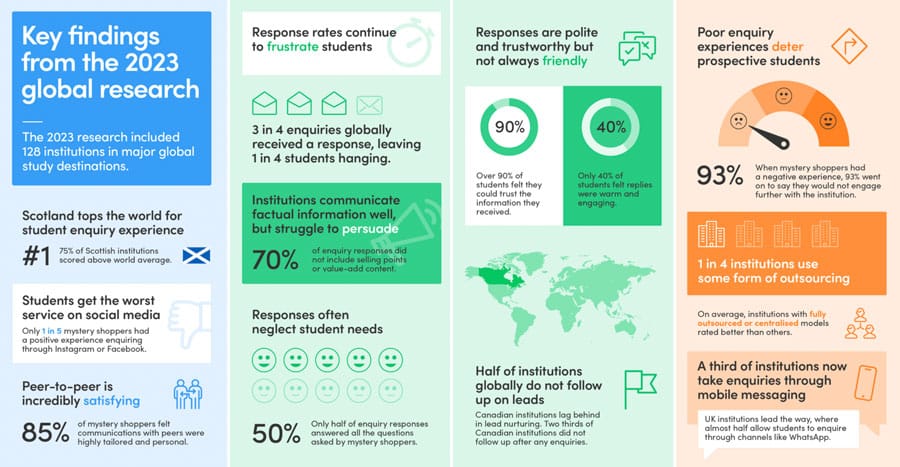Mystery shopping study indicates many institutions are still losing international student leads
- A mystery shopping study by Edified exploring the timeliness and quality of universities’ responses to prospective international students indicates that many institutions are losing leads by neglecting live chat and Instagram, not leveraging marketing automation, and not including key selling points in communications
- Australian, New Zealand, and Scottish universities performed the best across 128 institutions surveyed
- Study findings highlight the importance of incorporating a peer-to-peer channel into marketing and communications
The results are in from Edified’s 2023 Enquiry Experience Tracker, a global mystery shopping study that looks at how well education institutions respond to enquiries from prospective students. It’s the third year for the study, and this year the scope expanded to 128 institutions across Australia/New Zealand (ANZ), UK, Canada, Europe, and the Middle East.
The findings are fascinating, and the implications are crucial for educators to consider. A highlight: 93% of student mystery shoppers said that when they had a negative experience regarding their enquiry, they would not engage further with the institution.
The institutions that were mystery-shopped were in the UK (48), Canada (29), Australia (27), New Zealand (10), Ireland (5), Europe (5), and the Middle East (4). About one-third of all UK universities and over half of all ANZ universities were represented, and more than one-third of universities in the most popular Canadian provinces for international students, Ontario and BC, were included.
The project was conducted between April and June 2023. Six student personas did the “shopping” (e.g., high school student, university graduate, etc) and assumed nationalities including Nigerian, Filipino, Vietnamese, and more. They submitted their questions through several channels, including enquiry forms, live chat, Instagram, email, and peer-to-peer platforms. The responses were then rated according to:
- Communication quality
- Impact (i.e., persuasiveness)
- Availability and findability of key communication channels
- Timeliness of response
- Timeliness of follow-up after the initial response
Of all the measures, those needing the most improvement were timeliness of response and follow-ups to responses. The report notes, “a significant proportion of responses either go unanswered or receive slow responses.”
National superstars
Australia and New Zealand stand out for their excellent overall performance: six out of the top 10 scoring institutions – in terms of how promptly and well they responded to students – were from the ANZ region. But Scotland is also performing much above the global average score of 55 (out of a possible 100). Scottish universities claimed the top average score, and their responses to students were rated as the “friendliest and most trusted.” Fully 75% of Scottish universities scored above the global average. Canadian and UK universities fell into the average category with scores of 50 and 52, respectively.
The highest score achieved by a university was 81, and that was the Auckland University of Technology in New Zealand. The lowest score was 9.
Highs and lows
Looking at findings across the global spectrum:
- Most mystery shoppers felt they could trust the responses they received (90%), but only 40% said they got a warm and friendly feel from the responses;
- Only 50% felt all their questions were answered, and 70% did not feel persuaded since responses did not include selling points or value-adds;
- 3 in 4 mystery shoppers received a response, leaving 1 in 4 who didn’t;
- Only 20% got a follow-up, and the worst channel for this was live chat – only 1 in 10 students got a follow-up using this route, and the report notes that “most institutions are leaking leads through this channel”;
- Response timeliness has improved since the last study, with half of the responses received by students falling into an “excellent” timeframe;
- 85% felt communications with peers were highly tailored and personal – a key finding given the influence that peers have on study abroad decisions.
Responsiveness varies across enquiry channels
The most reliable channels for students were enquiry forms and email (80% got a reply through those channels). But many shoppers were utterly frustrated when asking questions through Instagram: a third received no response or received auto-replies asking them to enquire through another channel. This is a definite miss: students are on Instagram a lot more than they are on email, and they increasingly use the channel as a search engine to find information, including for study abroad.
The importance of follow-up and marketing automation
Half of the 128 institutions in the global sample did not continue in their communications with students with a follow-up, rising to two-thirds of Canadian institutions. The report notes:
“This is a significant gap and means there is a distinct advantage to those institutions that do have marketing automation campaigns in place …. Most institutions indicated that they do have a marketing automation platform in place, but some noted that it is not used all the time and/or that functionality was limited.”
Where are your leaks?
The report provides a series of great recommendations for institutions working to improve their communications with students. Perhaps the most important of the recommendations are to connect prospects with current students (e.g., on peer-to-peer platforms) and to look for weaknesses across an entire marketing, communications, and admissions system. The report asks:
“How well does data flow between your systems? Gaps, delays, and errors can mean that some prospects miss out on timely lead nurturing activity. If you’re collecting a prospective student’s email address and marketing consent in one place, make sure it flows through to your marketing automation platform.”

For additional background, please see:


















